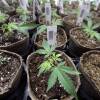It’s been five years since Massachusetts voters legalized recreational marijuana, paving the way for cannabis couriers and residents using marijuana to relieve pandemic-era stress .
Boston Globe reporter Dan Adams joined Boston Public Radio on Monday to share what five years of marijuana legalization has meant for Massachusetts.
“These sort of ‘sky is falling’ predictions that opponents imagined just haven't come to pass,” Adams said. “If you look at impaired driving statistics, or if you look at sales to minors, we just haven't had a lot of these kinds of issues.”
“At the same time, the industry just generated an incredible amount of money, and many fewer people are being arrested,” Adams added. “And so I think the proponents of [legalizing marijuana] feel like it's delivering on its basic promises.”
More Local News
Two of the main issues facing Massachusetts’ cannabis industry are community impact fees and equity gaps in the cannabis industry. Adams pointed to the case of former Fall River Mayor Jasiel Correia, who was found guilty of tax fraud and extortion after he solicited bribes from marijuana vendors looking to open dispensaries in the city.
“While [the case of former Mayor Correia] is an exception, it's kind of emblematic of how problematic this process has been at the local level, where a small number of local officials can have a huge amount of authority over which businesses get to move ahead and go on to the state approval process,” Adams said. “And unsurprisingly, that issue there has had a disproportionate impact on entrepreneurs of color, specifically on Black and brown entrepreneurs from these communities that got so heavily policed during the drug war.”
Both Northampton and Lee have dropped community impact fees for dispensaries, claiming that the cost of hosting marijuana operations do not warrant a higher local operating fee than those given to liquor stores.
“These fees are supposed to basically be proportionate to the impact that the businesses have, so the customers of the marijuana store are wearing out the roads, if the marijuana store is causing rates of drug use to go up in the community, those might be impacts that these fees ought to pay for,” Adams said. “But in reality, almost all municipalities simply take the maximum fee, which is 3% of revenue, and most of them spend it with very little accountability and very marginal relation to any impacts of these [marijuana] facilities.”
Despite the presence of legal marijuana dispensaries, the illicit market is still profitable in Massachusetts. Adams believes that this is because marijuana in Massachusetts is more expensive than in states like Oregon and Washington, partially due to Massachusetts’ cold climate that necessitates indoor, artificially lit growhouses for marijuana crops.
“People are still paying $55, $60, even $65 for an eighth ounce of flower, which is really quite expensive,” Adams said. “If you go out to a place like Oregon, you could get the same amount of cannabis for $10 or $15.”
Dan Adams is cannabis reporter for the Boston Globe and author of the “This Week in Weed” email newsletter — the irreverent and definitive insider’s diary of legalization in Massachusetts.








